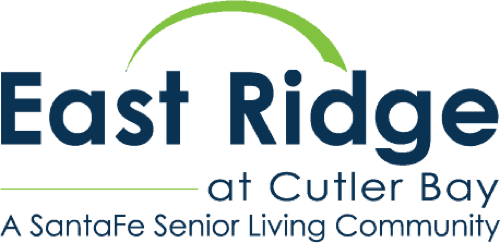There are many types and levels of care for seniors, but what if your loved one has special needs? For those with memory-related disorders such as dementia or Alzheimer’s disease, there’s a special type of care available known as memory support or memory care. It may be an option within an assisted living or skilled nursing community, or it may be a stand-alone facility specializing in dementia care.
At Three Palms Health Center at East Ridge at Cutler Bay, the memory support neighborhood known as Palm Lane is located in a special secure wing within the building where there are also assisted living, rehabilitation and skilled nursing. The community is not only for East Ridge residents but is available to the public.
Memory support usually involves features such as 24-hour supervision, ongoing medical monitoring and assistance with tasks of daily living. If properly designed for this kind of care, the community will offer a pleasant living environment both inside and out, with a layout that can be navigated easily. At the same time, there should be discrete security measures to assure residents’ safety.
Accommodations vary, and at Three Palms, there are private suites and one-bedroom residences. Families have the opportunity to furnish the residence and are encouraged to bring personal mementos that are meaningful to the resident.
Here are five tips to help you select the memory support setting that is right for your loved one.
1. Search by your location.
Begin your search online, by keying in “memory care” or “memory support” along with your zip code. Or, go to your state’s own “.gov” site and search in your area for facilities that have been thoroughly licensed and inspected – you should be able to read each facility’s recent state inspection reports. You’ll want to find a place near you so that it is easy to visit on a regular basis and your loved one doesn’t feel forgotten.
2. What about fees?
Knowing the fees upfront is vital, but ask what range of services are offered for the rates. Are the fees subject to change, and how often? Is there a deposit required at move in? Does the community work with insurance plans or have special programs for veterans?
3. What level of care is offered?
Do they begin with a thorough, individual assessment to determine what the prospective resident truly needs and create a care plan geared to their needs?
What services are included in the basic fee? What kind of one-on-one assistance can a resident expect? How does the community deal with special needs such as diabetic care, mobility issues, physical aggressiveness or wandering, and is there an extra fee? What about special dietary requests such as food allergies and preferences? What programs of physical therapy, exercise or social activities are offered and how often do they occur? What is the discharge policy, and how does the community work with hospice care when the time comes?
4. How about the staff?
What type of training have the caregivers received? Is there a physician who visits regularly? What is the ratio of staff to residents during the day and how does that change when nighttime comes? How does the staff handle any medical emergencies that may arise – what policies and protocols are in place? How does the community communicate with families about a resident’s well-being and what form do status reports usually take?
5. What does your intuition tell you?
Narrow down your list of communities to consider then schedule a tour. Be sure to stay for a meal to sample the dining experience. Meet the caregivers who will be responsible for your loved one’s care and don’t hesitate to ask lots of questions. What gut feelings do you get when you are there? Does the staff come across as pleasant, caring and knowledgeable? Does the general atmosphere feel right? Is it a place you would enjoy spending time? Remember, you’re there for an hour; your loved one will be there for a long while.
Applying some common sense and asking the right questions can help you find the community that’s the right fit for your loved one. Even after move-in, be sure to visit often and keep asking the staff relevant questions.
To learn more about the Three Palms Health Center with services and accommodations for memory support, assisted living and skilled nursing, please call 305.256.3564 for a tour.

